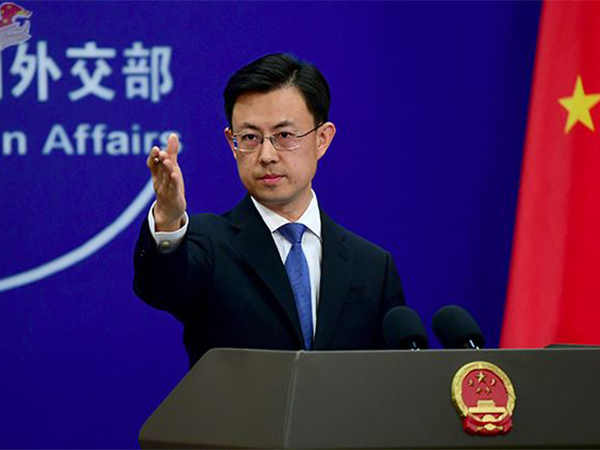Is Pakistan losing Riyadh?
Aug 31, 2020

By Francesca Marino
Rome [Italy], August 31 : "Pakistan can no longer wait ... I respectfully remind the OIC (Organization of the Islamic Cooperation) once again that we are expecting a meeting of foreign ministers belonging to the member countries of the organization. If you cannot do it, I will be forced to ask Prime Minister Imran Khan to hold a meeting of Islamic countries ready to stand by us on the question of Kashmir".
Speaking like this, during a television talk-show, was the Pakistani Foreign Minister Shah Mahmud Qureshi who, with an unprecedented externalization, shattered a ten-year protocol of relations between Pakistan and the Saudi "big brother" and gave the launch of a series of speculations on the geopolitical order or re-order of the region.
The Saudis, to tell the truth, did not take well the appeal of Qureshi which was seen as a real "sgarro" by the historical "younger brothers" and, as an immediate retaliation, they were quick to request the sudden repayment of a billion dollar loan renegotiated just six months ago.
Islamabad, cornered, asked the Chinese for the loan and repaid the debt. But, just to make things clear, it is only a drop in the sea of the six and more billion dollars of debt that Islamabad has with Saudi Arabia. Over the years, the alliance between Saudis and Islamabad has in fact been more or less indisputable postulate. An intricate web of financial and military relations has always existed between the two countries.
For Riyadh, the more or less remote control over Pakistan is of fundamental strategic importance, since it borders on Iran for about nine hundred kilometers. And that Islamabad is the only Muslim state to possess the atomic bomb and the largest and best-equipped Muslim army (mainly thanks to the West) in the world.
Pakistan has always guaranteed aid to Riyadh and trained Saudi troops. Riyadh, in exchange, obviously opened the purse strings by abundantly financing Islamabad and guaranteeing oil supplies at bargain prices. It also financed the Pakistani nuclear program: directly, but also by flying to the rescue of Islamabad at the time of the sanctions imposed by the United States in the aftermath of the nuclear tests. And it hosts, moreover, thousands of Pakistani workers.
Thus, strong of historical ties, a few days after the Qureshi gaffe, the Army Chief, General Qamar Javed Bajwa, and the ISI commander, Lieutenant General Faeez Hameed flew to Riyadh: officially to discuss military cooperation with their Saudi counterparts, actually trying to heal the rift created by their foreign minister.
Mohammad bin Salman, however, the "Saudi brother" to whom Imran Khan had acted as a personal driver on his last triumphal trip to Islamabad, said he was too busy to receive them. Not only that: MbS also invited Pakistan, in the press, to "downsize" its relations with China and to "let go of the Chinese" by ceasing to support them in skirmishes, military and otherwise, on the border with India.
It also seems that the Saudis have warned Islamabad not to support China with regard to investment projects for about 400 billion dollars in Iran. The Pakistani Foreign Ministry promptly denied it, but no one believed him.
Apparently, not only were Bajwa and Hameed's apologies not accepted, but the renewed proposal for a council of Arab countries on Kashmir once again fell on deaf ears. Result: not only Qureshi, as many thought, did not lose his job.
But, on the return of the scorned generals, he promptly flew to Beijing to meet his Chinese counterpart Wang Yi. In fact, China is now the only country, together with Erdogan's Islamized and dictatorial Turkey, which declares itself ready to defend the friendship "as deep as the sea and as high as the Himalayas" with Pakistani generals. Because the world is changing, the economy is an absolute priority and the alliance is based on this and not on age-old questions of principle.
So not only the Saudis seem to privilege the close economic ties with India and the alliance with the USA in opposing Iran, but also the Arab Emirates, with which Islamabad has tried to make a common front against the Saudis, have "betrayed" the cause by signing an agreement that normalizes relations with Israel.
If the Palestinian cause is ignored, said Imran Khan, "we will soon be forced to abandon any claim on Kashmir". And this, for Islamabad, is unacceptable. And it is also unacceptable for Beijing, which has appropriated a piece of Kashmir and is trying to occupy pieces of Indian territory to facilitate the Belt and Road Initiative. But at this point, Pakistan- many say- risks ending up like the earthenware pot between superpowers, and being shattered earlier, long before the dragon flag flies over Islamabad and not just Gwadar.
(Disclaimer: The views expressed in this column are strictly those of the author)


















